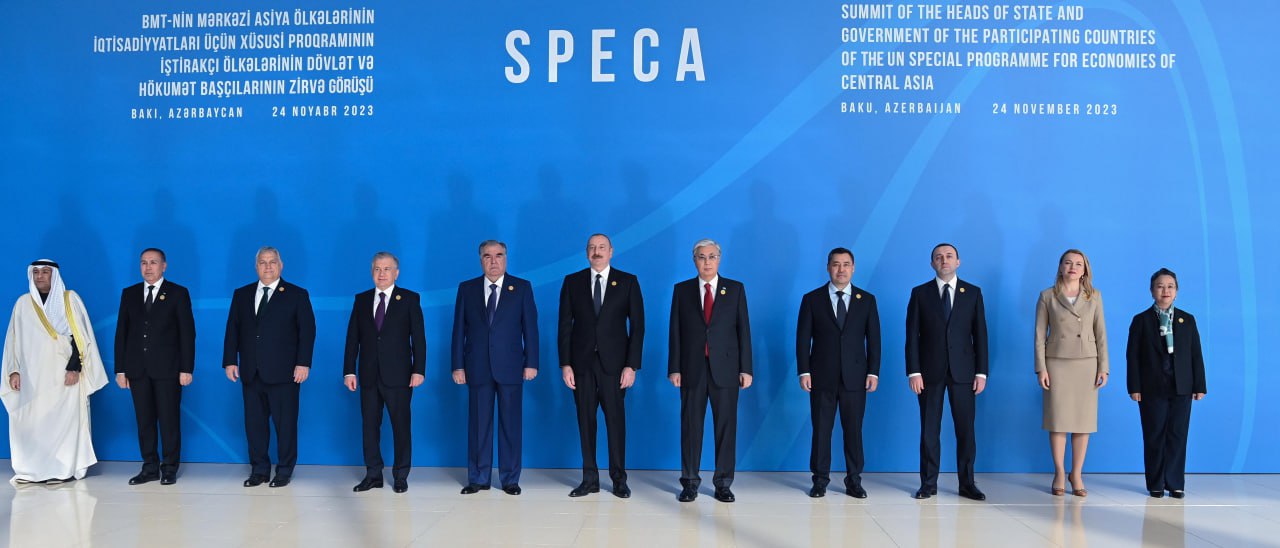ASTANA – President Kassym-Jomart Tokayev outlined Kazakhstan’s vision for further development of the United Nations (UN) Special Program for the Economies of Central Asia (SPECA) at the first Summit of the Heads of State and Government of the Participating Countries of the SPECA on Nov. 24 in Baku, reported the Akorda press service.

President of Azerbaijan Ilham Aliyev, President of the Kyrgyz Republic Sadyr Japarov, President of Tajikistan Emomali Rahmon, President of Uzbekistan Shavkat Mirziyoyev, Prime Minister of Georgia Irakli Garibashvili, Prime Minister of Hungary Viktor Orbán, Deputy Chairman of Turkmenistan’s Cabinet of Ministers Khojamurad Geldimuradov, Executive Secretary of the UN Economic Commission for Europe Tatiana Molchan, Executive Secretary of the Economic and Social Commission for Asia and the Pacific Armida Salsiah Alisjahbana, and Secretary General of the Cooperation Council for the Arab States of the Gulf Jasem Albudaiwi also delivered their remarks at the summit. Photo credit: Akorda
As the initiator of the creation of SPECA in 1997, the President shared that Kazakhstan is proud to witness its evolution into an effective platform for expanding regional cooperation and integrating into global economic processes.
He underlined the symbolic significance of today’s event, which coincided with the 25th anniversary year of the SPECA. Tokayev noted tangible steps towards reinforcing cooperation across key SPECA areas under Kazakhstan’s chairmanship last year.
“In an era of geopolitical fragmentation and a rapidly changing global economic environment, the SPECA’s relevance becomes increasingly vital,” he said.
The President reiterated Kazakhstan’s commitment to ensuring an inclusive future where all citizens benefit equally from social, technological, and economic progress. This achievement will be facilitated by the country’s initiative to create the UN Regional Center for Sustainable Development Goals (SDGs) for Central Asia and Afghanistan in Almaty.
“Currently, 80% of the state budget is already synchronized with SDGs,” Tokayev informed, noting that a new Social Code has strengthened the protection of vulnerable categories of citizens.
Speaking about trade opportunities, the President emphasized a three-fold increase to approximately $10 billion in turnover between Kazakhstan and the SPECA member countries, striving to double this figure.
He stressed that SPECA members can provide each other with various goods at competitive prices, reducing imports from other countries. He added that Kazakhstan is ready to increase exports to SPECA countries across 175 non-primary commodity items worth $2.3 billion.
Tokayev opined that creating green corridors and removing various barriers will bolster trade in construction, chemicals, and food industries.
Regarding industrial cooperation, the President saw significant potential for developing and producing innovative machinery for various sectors, assuring that large-scale, parity-based projects would enhance the global competitiveness of the region’s states.
Tokayev expressed Kazakhstan’s aspiration to contribute to food security by actively engaging with SPECA countries, advocating the establishment of the SPECA Trust Fund to stimulate investment cooperation.
“Over the past five years, we have doubled the volume of agricultural production and now export it to over 80 countries,” he emphasized.
The President highlighted the region’s huge role in international transport and transit routes, stressing the importance of developing and connecting the Trans-Caspian International Transport Route with the Belt and Road project, the Trans-European Transport Network (TEN-T), and the Global Gateway strategy.
“Over the past 15 years, our country has invested more than $35 billion in transport infrastructure,” he said, revealing plans to build over 1,300 kilometers of railways within the next three years to increase capacity towards China, Europe, Russia, and South Asia.
Touching on ecological collaboration, Tokayev called for a unified action plan to address the complex environmental situation in the Caspian Sea. He added that as the following year’s chair of the International Fund for Saving the Aral Sea, Kazakhstan will focus on preventing environmental degradation.
Recalling the country’s goal to achieve carbon neutrality by 2060, the President urged to intensify joint efforts on transitioning to alternative energy sources, and to support Kazakhstan’s initiative to create a Central Asian project office on climate issues in Almaty.
Identifying digital technology and artificial intelligence as promising areas for cooperation, Tokayev shared Kazakhstan’s intentions to bring IT exports to $1 billion by 2026.
The President conveyed Astana’s support for the institutionalization of SPECA and proposed creating a special working group and holding a panel session at the Astana International Forum next June.
In conclusion, Tokayev expressed confidence that the summit would result in specific mechanisms to enhance the SPECA’s effectiveness and strengthen the friendship and strategic partnership among member countries.
President of Azerbaijan Ilham Aliyev, President of the Kyrgyz Republic Sadyr Japarov, President of Tajikistan Emomali Rahmon, President of Uzbekistan Shavkat Mirziyoyev, Prime Minister of Georgia Irakli Garibashvili, Prime Minister of Hungary Viktor Orbán, Deputy Chairman of Turkmenistan’s Cabinet of Ministers Khojamurad Geldimuradov, Executive Secretary of the UN Economic Commission for Europe Tatiana Molchan, Executive Secretary of the Economic and Social Commission for Asia and the Pacific Armida Salsiah Alisjahbana, and Secretary General of the Cooperation Council for the Arab States of the Gulf Jasem Albudaiwi also delivered their remarks at the summit.
